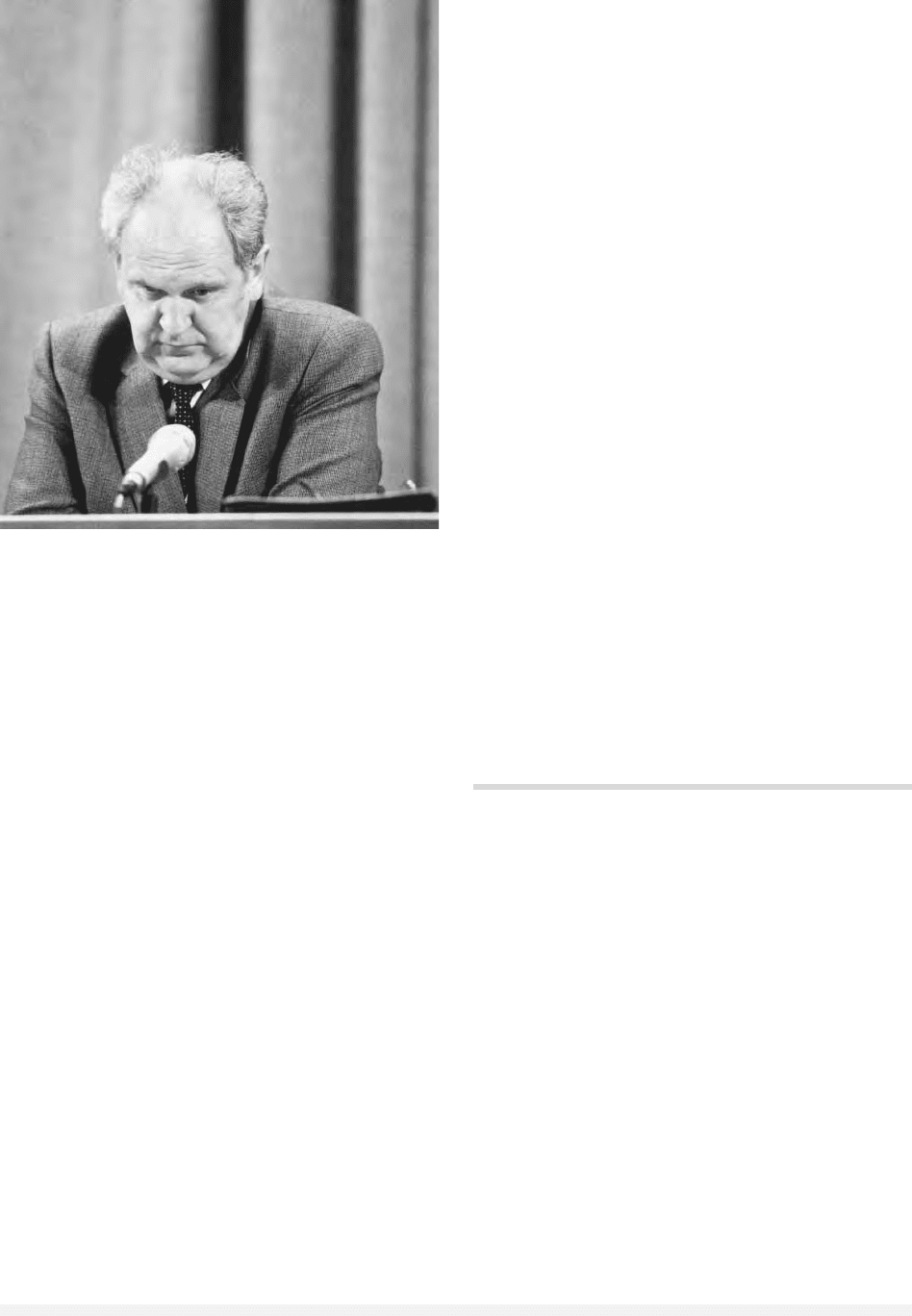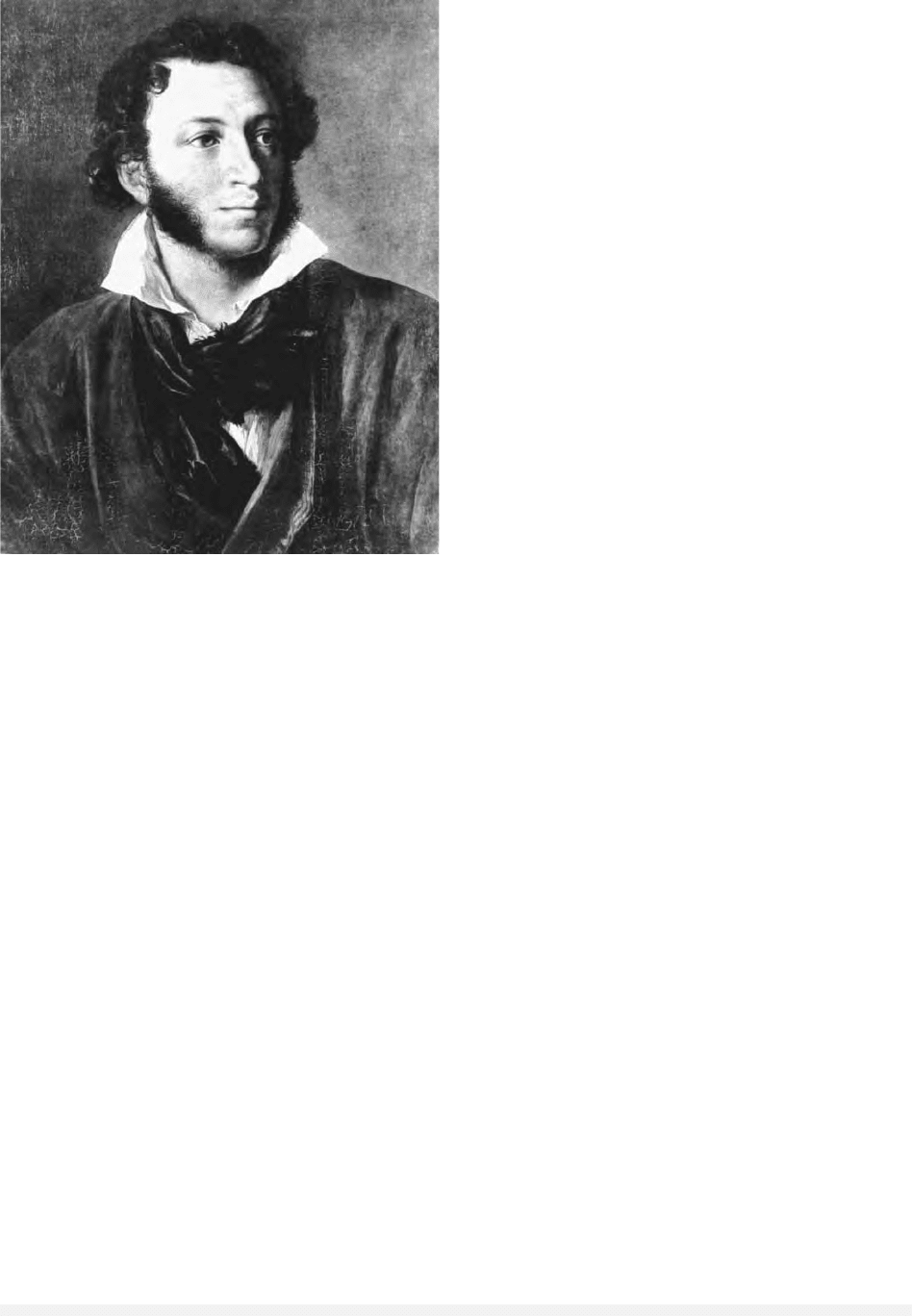Encyclopedia of Russian History
Подождите немного. Документ загружается.


In 1868, two years before Bismarck completed
the unification of Germany through a war with
France, he ensured himself of Russian support.
Specifically, Alexander II promised that if Prussia
and France went to war, he would mobilize 100,000
men on the Austrian border to ensure that Vienna
could not intervene on the side of France. Thus Rus-
sia played an important role in the Prussian-led
unification of Germany. And Russia would pay a
high price for this in 1914–1918.
See also: GERMANY, RELATIONS WITH; GREAT NORTHERN
WAR; POLAND; SEVEN YEARS’ WAR; VIENNA, CON-
GRESS OF; WORLD WAR I
BIBLIOGRAPHY
Albrecht-Carrie, Rene. (1958). A Diplomatic History of Eu-
rope since the Congress of Vienna. New York: Harper.
Bridge, F. R., and Bullen, Roger. (1980). The Great Pow-
ers and the European States System: 1815–1914. New
York: Longman.
Fay, Sidney. (1937). The Rise of Brandenburg-Prussia to
1786. New York: Holt.
Florinsky, Michael. (1953–55). Russia: A History and an
Interpretation. 2 Vols. New York: Macmillan.
Pflanze, Otto. (1990). Bismarck and the Development of
Germany, Vol. 1: The Period of Unification, 1815–1871.
Princeton, NJ: Princeton University Press.
Schroeder, Paul. (1994). The Transformation of European
Politics, 1763–1848. New York: Oxford University
Press.
Taylor, A. J. P. (1971). The Struggle for Mastery in Europe,
1848–1918. New York: Oxford University Press.
H
UGH
P
HILLIPS
PRUTH RIVER, CAMPAIGN AND
TREATY OF
The Campaign of Pruth River was the Russian re-
sponse to a declaration of war by the Ottoman Em-
pire in November 1710. By June 1711, the Russian
army under the command of Field Marshal Count
Boris Sheremetev and Tsar Peter the Great arrived
at the Pruth River in Ottoman territory. The Rus-
sians had about 38,000 infantry and 14,000 cav-
alry. The Ottoman forces, led by Grand Vizier
Baltadji Mehmed Pasha, numbered about 120,000
infantry and 80,000 cavalry. Peter was counting
heavily on an uprising of the Balkan Christians in
Wallachia and Moldavia to redress the numerical
imbalance. However, Wallachian support did not
materialize, leaving the Russian armies without
crucial supplies and reinforcements.
The fighting raged from July 9–11. The Russ-
ian situation quickly became critical because Peter
had earlier sent the Russian cavalry to the Ottoman
rear for the purpose of capturing or destroying Ot-
toman supplies. The outnumbered Russian infantry
made a stand at Stanelishte on the banks of the
Pruth without cavalry support. The Russians were
completely surrounded by the larger Turkish force.
Short of food and water, and with no possibility
of breaking through the encircling Ottoman forces,
the Russians opened negotiations.
The Treaty of Pruth was signed July 12, 1711,
between Russia and the Ottoman Empire. The
treaty dictated that Russia give up the fortresses of
Azov and Tagonrog, lose its permanent ambassador
in the Ottoman Empire, and dismantle both its forts
on the lower Dnieper and its Black Sea fleet. In ad-
dition, Russian troops were to leave Poland and
King Charles XII of Sweden would be permitted to
return to Sweden without Russian interference. In
return, the defeated Russian army received the right
to retreat unhindered to Russian territory. The ef-
fect of this treaty was to nullify the military gains
Peter had accrued against the Ottoman Empire
throughout his reign.
See also: PETER I; TURKEY, RELATIONS WITH
BIBLIOGRAPHY
Massie, Robert K. (1980). Peter the Great His Life and
World. New York: Ballantine.
J
EAN
K. B
ERGER
PSKOV JUDICIAL CHARTER
The Pskov Judicial Charter consists of 120 ar-
ticles. The preamble states that the Charter was
copied from charters of Grand Prince Alexander
and Prince Constantine. Most scholars believe the
Charter dates back to Alexander Mikhailovich of
Tver’ (prince of Pskov between 1327 and 1337).
Later additions were made by Alexander of Rostov
(governed sporadically between 1410 and 1434)
and Constantine Dmitrievich (served three times as
PSKOV JUDICIAL CHARTER
1243
ENCYCLOPEDIA OF RUSSIAN HISTORY

prince between 1407 and 1414) with further redac-
tions made in 1462 and 1474–1475. The Charter
notes that the provisions were blessed by the priests
of the five cathedrals in a meeting of the assembly
(veche) in 1397, but the fifth cathedral was not
founded until 1462. In 1397 Novgorod and Pskov
concluded an “eternal peace,” and it is possible that
a redaction was made to formalize Pskov’s inde-
pendence, which existed de facto since 1348. Arti-
cle 108 stipulates that only the veche may make
changes in the Charter.
Princes played important roles in judicial pro-
ceedings, particularly for theft, and received judi-
cial fines for such crimes as murder. The prince,
mayor (posadnik), and Novgorodian archbishop all
had independent courts. The prince and the mayor
had to hold joint courts in the prince’s quarters and
not in the veche. The Charter consistently admon-
ishes the courts to kiss the cross, judge justly, pro-
tect the innocent, and condemn the guilty. Mayors,
before leaving office, must conclude all litigation
on their docket.
The Charter provides for the death penalty for
robbery within the central fortress, stealing horses,
treason, or arson. Execution is also mandated for
the third offense of theft within the posad, the area
outside the fortress. The Council of Lords (gospoda),
the highest administrative and judicial body, de-
cided conflicts over land and forests, and could di-
rect litigants to settle their dispute by duel (trial by
combat). Duels were utilized for a wide variety of
cases and could end in the death of one of the par-
ties. The old and the weak, the clergy, and women
could hire substitutes to fight a man, but duels
were permitted between women. Duels were also
common in later Muscovite law, despite the oppo-
sition of the Church to such practice.
Written and physical evidence and eyewitness
testimony were important, as was the kissing of
the cross and the giving of oaths, which carried
great weight in judicial proceedings. In property
disputes, four or five witnesses might be called to
testify, but absent such corroborating witnesses,
the taking of an oath was sufficient to exonerate a
defendant.
The Charter offered certain protections to
craftsmen, the poor, and women. A master crafts-
man had the right to sue for unpaid wages. Even
indentured laborers (singular, zakupen) and herds-
men could sue for their property or grain before
the Council of Lords. A widow whose husband died
without leaving a last will had the usufruct of the
property, unless she remarried. Women could in-
herit property and leave behind their own wills.
The Charter enjoined children to feed their parents,
or forfeit their rights to an inheritance.
The Charter gives particular attention to ten-
ant farmers (izorniki), who could contest the claims
of their lords over loans. Lords were required to
produce as many as four or five witnesses to sup-
port their claims. Tenant farmers, gardeners, and
fishermen could not leave their villages except on
St. Philip’s Fast (November 14), a provision that
anticipated the limitations imposed on peasant
movement in the Muscovite Law Code (sudebnik) of
1497. Conflicts over tenant farmers who left their
villages legally, or lords who terminated their con-
tracts with a farmer, were resolved by each re-
ceiving one-half of the harvest. Lords could recover
their loans by seizing the property of tenant farm-
ers who fled illegally. The Charter also provided for
inheritance rights of tenant farmers, while it pro-
tected a lord’s right to recover his loans.
The Charter outlines the duties of bailiffs and
their fee schedules. Court procedure required only
the two litigants to appear in court to speak for
themselves. Women and children, along with
monks, nuns, the elderly, and the deaf could have
spokesmen. Mayors in particular were forbidden
from supporting claimants in court.
The Charter also carefully delineates procedures
concerning suits over loans, collateral guarantees,
and interest payments, all of which reflect the com-
mercial character of the city. It allowed master
craftsmen to sue their apprentices over the cost of
their training. Creditors and debtors retained their
rights to sue one another over their agreements.
Many of these cases would appear before the Coun-
cil of Lords. There are also provisions regulating
brawls that broke out at feasts. Each fraternity
(bratchina), an association perhaps of craftsmen,
had jurisdiction over its own members.
See also: NOVGOROD JUDICIAL CHARTER; NOVGOROD THE
GREAT; POSADNIK
BIBLIOGRAPHY
Kaiser, Daniel, tr. and ed. (1992). The Laws of Russia, Se-
ries 1, Vol. 1: The Laws of Rus’, Tenth to Fifteenth Cen-
turies. Salt Lake City, UT: Charles Schlacks, Jr.
Vernadsky, George. (1969). Medieval Russian Laws. New
York: Norton.
L
AWRENCE
N. L
ANGER
PSKOV JUDICIAL CHARTER
1244
ENCYCLOPEDIA OF RUSSIAN HISTORY

PUBLIC OPINION STUDIES
Public opinion research had a long and checkered
career in Soviet times, alternately encouraged then
frowned upon from the 1950s through the 1980s.
After the fall of the Communist Party and disso-
lution of the Soviet Union, attitudinal research be-
gan to play a much more important role in public
life in Russia (as elsewhere in the former USSR).
The Moscow-based All-Union Center for the Study
of Public Opinion (VTsIOM)—renamed the All-
Russian Center under the same acronym—continued
its existence, now as a quasi-state body. But the
monopoly held mostly by VTsIOM and sociologists
working at the Academy of Sciences (AN) had al-
ready been broken in the late 1980s with the es-
tablishment of new, private polling firms.
Among the first of these independent compa-
nies was Vox Populi (headed by Boris Grushin, for-
merly at VTsIOM); ROMIR (directed by Yelena
Bashkirova, formerly a researcher at the AN’s In-
stitute of Sociology [ISAN]); and CESSI (directed by
Vladimir Andreyenkov, former chief of methodol-
ogy at ISAN). The Center for Human Values—also
staffed by former ISAN researchers—and Moscow
State University also conduct public opinion re-
search.
As public opinion studies became more impor-
tant in the political and social life of the country,
these companies had to evolve as well. Their prac-
tices changed to meet world standards. Sampling
methodology, interviewing techniques, and data
workup all rose in quality to satisfy the demands of
both domestic and, increasingly, foreign clients. The
number of primary and secondary sampling units,
and sampling points, often tripled or quadrupled
in order to provide greater variance. Interviewing
through self-administered questionnaires—standard
in Soviet times—gave way to face-to-face interviews
in the homes or workplaces of respondents. Data en-
try and weighting improved substantially also.
Other offshoots of ISAN or VTsIOM, such as
INDEM, headed by Georgy Satarov, and the Public
Opinion Foundation (FOM), with Alexander Oslon
in charge, played a second role. As Russian presi-
dents Boris Yeltsin and especially Vladimir Putin
increasingly took public opinion into account in de-
ciding domestic policy, they turned to experts like
Satarov, Grushin, and Oslon for counsel.
Public opinion research in Russia today takes
many forms. Most common is the nationwide sur-
vey of adult Russians chosen by random sampling.
A typical sample size is 1,500 to 2,000 adults, but
some samples are larger. Other polls are of elites
only, with much smaller samples drawn from po-
litical leaders (in the government or in parties) at
the central and local level; state economic managers
and private entrepreneurs; military officers; media
figures; and members of the cultural and scientific
intelligentsia. A third form of research involves
(typically) 8 to 10 focus groups, in 3 to 5 cities;
these small groups (usually of 8 to 12 people) of
predetermined composition discuss in depth one or
two important issues in an agenda set by the re-
search firm and its client.
Many research firms disseminate their poll re-
sults widely—in newspapers or their own publica-
tions, through news agencies, and on television.
Even more important, several have their own Web
sites and put up current (and archived) poll results.
Unfortunately, much information about sample
sizes, dates of interviewing, and margins of sam-
pling error are not usually given in popular citations
of the research, severely limiting the usefulness of
the findings.
See also: DEMOCRATIZATION; ECONOMY, POST-SOVIET;
GLASNOST
S
TEVEN
A. G
RANT
PUGACHEV, EMELIAN IVANOVICH
(c. 1742–1775), Russian cossack rebel and imper-
ial impostor, leader of the Pugachevshchina.
Emelian Pugachev headed the mass uprising of
1773–1774 known as Pugachevshchina (loosely
translated as “Pugachev’s Dark Deeds”). The blood-
iest rebellion against central state authority and
serfdom between 1618 and the Revolutions of 1905
and 1917, it disrupted an immense territory and
momentarily threatened the Muscovite heartland.
Thousands of individuals from disparate social
groups and ethnicities challenged Catherine II’s
legitimacy and aggravated international tension
from prolonged Russo-Turkish hostilities. Many
suspected upper-class, religious, or foreign inspira-
tion behind the upheaval, widely reported by the
European press. Particularly provocative was Pu-
gachev’s impersonation of Peter III (1728–1762),
which recalled Catherine’s usurpation of power.
The revolt originated among the Yaik (Ural)
cossacks, a frontier “warrior democracy” that re-
PUGACHEV, EMELIAN IVANOVICH
1245
ENCYCLOPEDIA OF RUSSIAN HISTORY

sisted pressure from state expansion. Disputes over
the elected leadership led to government suppres-
sion of a cossack mutiny in January 1772, which
left the community divided and resentful. Pu-
gachev, a Don cossack fugitive, visited the area in
late 1772. A typical primitive rebel, Pugachev was
illiterate and his biography obscure. His imposture
was not original; he was one of some seven pre-
tenders since 1764. Shrewd, energetic, and experi-
enced in military affairs, he was also charismatic.
It is unclear whether he initiated renewed revolt or
was persuaded to lead it by the cossacks.
About sixty rebels issued a first manifesto in
late September 1773, presumably dictated by Pu-
gachev or cossack scribes, calling on cossacks,
Kalmyks, and Tatars to serve Peter III in pursuit of
glory, land, and material reward. The rebels focused
on frontier freedom or autonomy, but Peter III’s
name lent national stature to the burgeoning
movement. Within weeks their forces exceeded two
thousand besieging the fortress of Orenburg and
spreading the revolt into the Ural Mountains with
specific appeals to diverse social and ethnic groups.
Turkic Bashkirs joined in force as the regional re-
bellion evolved into three chronological-territorial
phases.
The Orenburg-Yaitsk phase lasted from Octo-
ber 1773 until April 1774, when the rebel sieges of
Orenburg, Yaitsk, and Ufa were broken, Pugachev
barely escaping. Shielded by spring roadlessness,
the rebels replenished ranks while fleeing north-
ward through the Urals. This second phase culmi-
nated in the plunder of Kazan on July 23 before
the horde was defeated and scattered. With rebel
whereabouts unknown, panic seized Moscow, but
news of peace with the Turks soon allayed fears.
Pugachev fled southward down the Volga, ex-
terminating the nobility and government offi-
cials—the third and final phase. This rampage
sparked many local outbreaks sometimes called
“Pugachevshchina without Pugachev.” The main
rebel force was decisively defeated south of Tsarit-
syn on September 5. To save themselves, some cos-
sacks turned Pugachev over to tsarist authorities
at Yaitsk on September 26, 1774. After lengthy in-
terrogation he was beheaded and then quartered in
Moscow on January 21, 1775. To erase reminders
of the revolt, Yaitsk, the river, the cossacks, and
Pugachev’s birthplace were all renamed, his wife
and children exiled. Late in life Alexander Pushkin
(1799–1837) popularized Pugachev in history and
fiction. “The Captain’s Daughter” became an in-
stant classic, famously declaiming “God save us
from seeing a Russian revolt, senseless and merci-
less.” But agrarian anarchist dissidents found in-
spiration in Pugachev for grassroots rebellion. After
1917 the Soviet regime endorsed Pugachev’s fame,
recasting the revolt as a peasant war against feu-
dal society and autocratic government.
See also: CATHERINE II; PEASANTRY; PETER III; PUSHKIN,
ALEXANDER SERGEYEVICH
BIBLIOGRAPHY
Alexander, John T. (1969). Autocratic Politics in a Na-
tional Crisis: The Imperial Russian Government and Pu-
gachev’s Revolt, 1773–1775. Bloomington: Indiana
University Press.
Alexander, John T. (1973). Emperor of the Cossacks: Pu-
gachev and the Frontier Jacquerie of 1773–1775.
Lawrence, KS: Coronado Press.
Pushkin, Alexander. (1983). “The Captain’s Daughter”
and “A History of Pugachev.” In Alexander Pushkin:
Complete Prose Fiction, ed. Paul Debreczeny. Stanford,
CA: Stanford University Press.
Raeff, Marc. (1970). “Pugachev’s Rebellion.” In Precondi-
tions for Revolution in Early Modern Europe, eds. Robert
Forster and Jack P. Greene. Baltimore: Johns Hop-
kins University Press.
J
OHN
T. A
LEXANDER
PUGO, BORIS KARLOVICH
(1937–1991), Party official involved in the 1991
coup attempt against Boris Yeltsin.
Born in Latvia, Boris Karlovich Pugo was a
Communist Party and state functionary whose ca-
reer was shaped by Leonid Brezhnev’s “mature so-
cialism.” This was a time of ossification in the
leadership and mounting economic crisis that gave
way to attempts to reform the system from within
under the direction of Yuri Andropov, former head
of the KGB, and then, after a brief interval, to more
systemic reforms under Mikhail Gorbachev. Like
many leaders of the Brezhnev era, Pugo began his
career as an official in the Komsomol. His career
was closely connected with Soviet power in his na-
tive Latvia, where he served as head of the local
KGB and later as first secretary of the Latvian Com-
munist Party.
Pugo came to prominence with the advent of
glasnost and perestroika. In 1988 he was appointed
chairman of the powerful CPSU Control Commis-
PUGO, BORIS KARLOVICH
1246
ENCYCLOPEDIA OF RUSSIAN HISTORY

sion in Moscow, a post he held for two years. This
was a time of struggle within the Communist
Party, for Gorbachev’s effort to use it as a vehicle
for reform had failed and only managed to split the
Party along pro- and anti-reform lines. In the Baltic
republics even the local Communist parties were
joining in the call for independence by the summer
of 1990. In December, Gorbachev appointed Pugo
minister of internal affairs.
The appointment came at a time of crisis for
perestroika. There were increasing calls for inde-
pendence in the Baltic republics. Opponents of reform
in Moscow, such as the “Black Colonel” Viktor Alk-
snis, were calling for a crackdown against anti-
Soviet elements, especially in the Baltic republics.
Hardliners argued that the impending war between
the United States and Iraq would distract interna-
tional opinion from a Soviet crackdown. As one of
his first acts as minister of internal affairs, Pugo
took a leading role in the attempt to reassert So-
viet power in the Baltic republics. The crackdown
in Vilnius, poorly organized and indecisive, collapsed
in the face of popular resistance in the republics
and Gorbachev’s failure to support it publicly.
In August 1991 Pugo joined in the desperate
attempt by the State Committee for the State of
Emergency to remove Gorbachev and prevent the
approval of a new union treaty that would bring
about a radical shift in power from all-union in-
stitutions to the constituent republics, especially
the Russian Federation under its popularly elected
president, Boris Yeltsin. The so-called putsch in
which the committee attempted to seize power was
poorly organized and badly prepared. Within a
matter of days it collapsed. Boris Pugo committed
suicide on August 22, together with his wife,
Valentina. His suicide note contained a brief expla-
nation of his actions: “I put too much trust in peo-
ple. I have lived my life honestly.”
See also: AUGUST 1991 PUTSCH; SOYUZ FACTION
BIBLIOGRAPHY
Albats, Yevgeniia. (1994). The State Within a State: The
KGB and Its Hold on Russia—Past, Present, and Fu-
ture. New York: Farrar, Straus, Giroux.
Aron, Leon. (2000). Yeltsin: A Revolutionary Life. New
York: St. Martin’s Press.
Lieven, Anatol. (1993). The Baltic Revolution: Estonia,
Latvia, Lithuania, and the Path to Independence. New
Haven, CT: Yale University Press.
Medevev, Roy. (2002). “Yesteryear: Three Suicides.”
Moscow News No. 023 (August 21).
J
ACOB
W. K
IPP
PURGES, THE GREAT
The term Great Purges does not accurately designate
the chaotic chain of events to which it is applied
and was never used by the Soviet authorities. The
regime tried to cover up the large-scale violence it
had deployed between the summer of 1936 and the
end of 1938. Although scholars apply the term
purges to this period, many of them agree that the
appellation is misleading. It implies that the Bol-
shevik attempts to eliminate the system’s presumed
enemies were a carefully planned, faithfully exe-
cuted series of punitive operations, and this was far
from being the case. The terror of 1936 to 1938
emerged without clear design—it targeted ill-de-
fined categories of people and it proceeded haphaz-
ardly. Although purges victimized around 1.5
million individuals, they did not succeed in ridding
the country of the problems they were supposed
to stamp out.
PURGES, THE GREAT
1247
ENCYCLOPEDIA OF RUSSIAN HISTORY
Interior Minister Boris Pugo bows his head during the press
conference held by the leaders of the August 1991 coup. He
committed suicide days later. © S
HEPARD
S
HERBELL
/CORBIS SABA

FEAR OF OPPOSITION
The Bolsheviks were convinced that the USSR was
threatened by internal adversaries. They never hes-
itated to attribute discontent among the people to
instigation by irreconcilably hostile elements, and
they frequently did not even trust fellow militants.
In the course of the 1930s, failure was increasingly
imputed to deliberate sabotage.
There was barely a sector of life where the
regime’s initiatives succeeded. Collectivized agricul-
ture did not feed the country properly, industry did
not work according to plans, the Communist Party
and the state administration did not carry out im-
portant directives. Peasants on collective farms did
their best to avoid work, officeholders in the coun-
tryside vacillated between compromising with
rural ways and taking brutal measures, workers
were hard to discipline, managers invented ways
to seem to be doing their jobs, officials in all insti-
tutions eagerly covered up for incompetent col-
leagues and the true state of affairs. The Bolsheviks
were unwilling to acknowledge that the masses
were only reacting to the outcome of the regime’s
policies, and top decision-makers were unable to
grasp that subordinates were following their own
example of not speaking out about inextricable
issues, leaving problems unsolved, blaming whip-
ping boys for their own miscalculations, and lav-
ishing praise on achievements that were more than
dubious. The elite never came close to recognizing
that the monopoly of the Party-state in nearly
every domain left no room for checks and balances,
and that attempts to improve the situation could
not bring results as long as they were entrusted to
the very establishment whose practices had to be
corrected. The leaders could not see that the regime’s
difficulties were part-and-parcel of the system and
could not be overcome without changing it com-
pletely.
Unwilling to accept responsibility for the sys-
tem’s failures, the Bolsheviks intensified the search
for hidden enemies. Even top leaders were convinced
that intractable problems were due to subversion.
They projected the secretive character of their own
dealings onto controlled aspects of the Party and
state apparatus, and imagined conspiratorial in-
trigues behind the USSR’s accumulating troubles.
For Bolsheviks, there was no question but that the
remnants of the prerevolutionary elite, adherents
of defunct parties, and former kulaks represented
a threat. They also suspected erstwhile opposition-
ists of disloyalty. Many of the Trotskyites and
other deviationists of the 1920s had the same rev-
olutionary credentials as their persecutors and thus
were seen as dangerous rivals for legitimate au-
thority. Josef V. Stalin feared that they might try
to claim power if the situation worsened.
Although thousands of deviationists remained
in the Communist Party until 1937, many others
PURGES, THE GREAT
1248
ENCYCLOPEDIA OF RUSSIAN HISTORY
Workers in a Leningrad turbine shop listen to a report on the trial and execution of Grigory Zinoviev, Lev Kamenev, and fourteen
others convicted of plotting against Stalin. © H
ULTON
-D
EUTSCH
C
OLLECTION
/CORBIS

were expelled during membership screenings in
1935 and 1936. Starting in 1935, secret directives
instructed the NKVD to detect their terrorist inten-
tions, even if they were in exile and detention. A
show trial highlighted the terrorist designs of the
deviationist leaders Lev B. Kamenev and Grigory E.
Zinoviev in August 1936, and this date is seen as
the starting point of the Great Purges.
THE PURGES BEGIN
The trial of Lev B. Kamenev and Grigory Y. Zi-
noviev and subsequent directives from the Central
Committee triggered a vigilance campaign within
the Party. The campaign targeted not only the op-
position, but also Party members who had criti-
cized the Party or whose work and lifestyle brought
discredit to the Bolsheviks. The failures of agricul-
ture, construction, industry, and other branches of
the economy provided a legion of opportunities to
denounce workers and managers. Poor results, er-
rors, and accidents were reclassified as intentional
sabotage. There were plenty of motives to level
accusations of poor discipline, since the campaign
came during a severe crop failure and in the wake
of a Stakhanovist drive that had disorganized pro-
duction and undermined workplace safety. Leading
cadres were reluctant to dig too deeply into condi-
tions in their workplaces, and it was safer to sin-
gle out alleged Trotskyites as scapegoats, for the
Party already had a tendency to blame them for
nearly every shortcoming.
Sabotage is more accurately described as the
regime’s daily routine. Inefficiency, abuses, and
heavy-handed handling of subordinates and the pop-
ulation disrupted the proper functioning of the Party,
the state, and the national economy. The charge of
oppositionist schemes was more problematic. It
was used to justify the elimination of imprisoned
Party members who had been dissidents in the
1920s. It was also used to stigmatize anyone who
could be blamed for the regime’s shortcomings
without having to indicate any fault other than al-
leged sympathy, association, or even simple ac-
quaintance with Trotskyites. Insinuations of this
sort obscured Party efforts to correct official mis-
conduct, facilitated scapegoating, and deflected
blame onto the most vulnerable cadres. But there
was hardly any other feasible way to dissociate the
regime from its misdeeds and to suggest that the
culprits were foreign or hostile to the Soviet ideal.
The scapegoats singled out in this way were
made to answer for the defects of the Soviet sys-
tem. Since many officeholders were at least partly
responsible for the difficult living and working con-
ditions imposed on them, the masses were not im-
pervious to the argument that their superiors were
enemies of the people. Quite a few citizens were
ready to take up this argument against unpopular
bosses as a way of venting their discontent and
avenging past mistreatment and humiliations.
The leaders of the purges often emphasized that
the alleged enemies were Party members in order
to exploit tensions within the Party, in government
agencies, and in other administrations. A show trial
in January 1937 abundantly featured charges of
wrecking and treason against Yuri L. Piatakov,
deputy commissar of heavy industry and former
member of the Central Committee, and other
prominent figures in economic management and
foreign affairs. Those who engineered this attack
on leading Communists also tried to mobilize sup-
port in the lower ranks of the Party. The plenum
of the Central Committee in February and March
1939 decided to reelect officeholders by secret bal-
lot. It also decided to use the secret ballot at forth-
coming elections for the Supreme Soviet, where, for
the first time since the Revolution, all citizens were
supposed to vote and have the right to be run for
office. High officials at the plenum warned that
subversive elements were likely to take advantage
of the election campaign. They were aware of the
discontent among the masses that had surfaced in
public discussions about the recently adopted con-
stitution, and especially that some people were
attempting to invoke their constitutionally guar-
anteed rights to reclaim confiscated property and
to freely practice religion.
The Party elections were expected to eliminate
disruptive practices and boost the regime’s reputa-
tion by replacing unruly and unpopular cadres. The
targeted members did everything possible to ensure
their reelection, because fallen communists risked
jail—or worse. Networks of mutual aid were set in
motion to rescue colleagues whose defeat would
have endangered the position of everyone connected
to them. While many targeted communists were
saved, others were irreparably damaged when the
police stepped in. By the summer of 1937, the win-
ners of the intra-Party elections increasingly faced
charges of having deceived the Party faithful. By
that time, Party members alarmed by the increas-
ing popular unrest had convinced the top leader-
ship that it was necessary to launch an extensive
purge. The crackdown came suddenly. No arrange-
ments had been made to prepare concentration
PURGES, THE GREAT
1249
ENCYCLOPEDIA OF RUSSIAN HISTORY

camps for the arrival of several hundred thousands
of prisoners.
Seen as a preventive strike before the elections
to the Supreme Soviet, the massive operation tar-
geted a wide spectrum of so-called class enemies:
kulaks, members of dissolved parties, ecclesiastics,
sectarians, recidivist criminals. Moscow ordered the
regional administrations to shoot, imprison, or de-
port specific quotas of enemies. Three-member
boards (troikas) handed down summary sentences.
This operation had hardly begun when another ter-
ror campaign was initiated. The new campaign was
ostensibly aimed at ethnic Poles accused of being
agents of the Polish government, but it was soon
extended to other minorities, most of whom were
not even mentioned in the central directives. No
limits were set on the number of victims of this
cleansing. Both operations were expected to end in
December 1937, on the eve of the elections.
At first glance, it was easy to identify people on
the basis of their past activities or political affilia-
tions, especially former oppositionists. Nonetheless,
it was impossible to know what constituted devia-
tion because the term applied to attitudes as well as
behaviors. In the same way, there was no guaran-
tee that only declassed people and believers were dis-
satisfied with the regime. Moreover, there was no
guarantee that potential subversion by foreign gov-
ernments could be countered by massacring their
ethnic kin.
OUTCOME
The Great Purges resulted in chaos. About 100,000
Party members were arrested, often tortured to con-
fess to concocted charges, and sent before the firing
squad or to camps. But it soon became evident that
many of them were victims of overzealous officials,
some of whom were themselves later purged. The
mass terror took almost a year more than projected.
This was partly because zealous cadres sought to
demonstrate their vigilance by requesting new quo-
tas from Moscow for additional arrests and shoot-
ings. The names of purported accomplices were
frequently obtained by cruelly mistreating the de-
tainees. People were sometimes punished because of
a foreign-sounding name or simply because anyone
could be accused of being a German, Japanese, Lat-
vian, or Greek spy. The campaign took on a life of
its own. Even when it was halted in November 1938,
scheduled executions continued in some regions.
More than 680,000 people were killed in 1937
and 1938, and about 630,000 were deported to
Siberia. Nevertheless, two years after the purge the
number of persons listed as politically suspect by
the secret police exceeded 1,200,000. But official
misconduct, incompetence, and networks of soli-
darity did not change, despite the massive change
in the leading personnel. The national economy and
the administration suffered from the loss of valu-
able specialists, and the hunt for enemies in the
army decapitated the high command and decimated
the officer corps. Many of the victims were sin-
cerely devoted to the principles of Bolshevism.
The Great Purges are usually associated with
Joseph V. Stalin and his police chiefs, Nikolai I.
Yezhov and Lavrenty P. Beria. But their true ori-
gin lay in the Soviet regime’s inability to utilize
modern techniques for managing institutions, po-
litical processes, and social relations. The purges
showed that indiscriminate campaigns, police op-
erations, and violence would play an important role
as policy instruments and take priority over eco-
nomic and administrative incentives to enlist pop-
ular support. They also showed the disastrous
consequences of the system’s lack of independent
watchdog agencies that could, if necessary, restrain
the Party-state’s actions. The intent behind the
purges bore some resemblance to social engineer-
ing, but the sociopolitical framework led to an out-
come that had little in common with the original
aims.
See also: BERIA, LAVRENTI PAVLOVICH; GULAG; KOMANEV,
LEV BORISOVICH; SHOW TRIALS; STALIN, JOSEF VIS-
SARIONOVICH; STATE SECURITY, ORGANS OF; YEZHOV,
NIKOLAI IVANOVICH; ZINOVIEV, GRIGORY YEVSEYEVICH
BIBLIOGRAPHY
Chase, William J. (2001). Enemies Within the Gates? The
Comintern and the Stalinist Repression, 1934–1939.
New Haven, CT: Yale University Press.
Conquest, Robert. (1990). The Great Terror: A Reassess-
ment. New York: Oxford University Press.
Getty, J. Arch. (1985). Origins of the Great Purges: The So-
viet Communist Party Reconsidered, 1933–1938. Cam-
bridge, UK: Cambridge University Press.
Getty, J. Arch. (1999). The Road to Terror: Stalin and the
Self-Destruction of the Bolsheviks, 1932–1939. New
Haven, CT: Yale University Press.
Getty, J. Arch. (2002). “’Excesses Are Not Permitted’:
Mass Terror and Stalinist Governance in the Late
1930s.” Russian Review 2:113–138.
Getty, J. Arch, and Manning, Roberta T., eds. (1993).
Stalinist Terror: New Perspectives. Cambridge, UK:
Cambridge University Press.
PURGES, THE GREAT
1250
ENCYCLOPEDIA OF RUSSIAN HISTORY

Siegelbaum, Lewis, and Sokolov, Andrei. (2000). Stalin-
ism as a Way of Life: A Narrative in Documents. New
Haven, CT: Yale University Press.
G
ABOR
T. R
ITTERSPORN
PUSHKIN, ALEXANDER SERGEYEVICH
(1799–1837), considered Russia’s greatest poet, au-
thor of lyrics, plays, prose, and the novel in verse
Eugene Onegin.
Of the Russian poets, none is mentioned by
Russians with more reverence than Alexander
Sergeyevich Pushkin. His work has been set to
opera by Mikhail Glinka, Modest Mussorgsky,
Nikolai Rimsky-Korsakov, and Peter Tchaikovsky;
his lyrics have been memorized by young school-
children throughout the former Soviet Union; and
leading poets of the twentieth century, such as
Anna Akhmatova, Marina Tsvetaeva, and Alexan-
der Blok, emphasized his impact on their work and
lives. Pushkin may indeed have opened the door for
the later part of the so-called Golden Age of Russ-
ian literature. At the 1880 ceremony following the
unveiling of the Pushkin statue in Moscow, Ivan
Turgenev credited Pushkin with giving birth to the
Russian literary language; Fyodor Dostoyevsky, in
an impassioned, near-hysterical speech, declared
Pushkin superior to Shakespeare.
Such reverence is certainly merited, but rever-
ence has its dangers. The author of the novel in
verse Eugene Onegin, the historical play in verse Boris
Godunov, the cryptic yet fluid “Belkin Tales,” the
brilliant “Little Tragedies” (four plays in blank
verse, three of which deal with crimes of passion)
the stylized folktale “Ruslan and Lyudmila,” the
tense, fatalistic story “Queen of Spades,” and hun-
dreds of lyrics, a master of style who absorbed and
transformed European literary traditions and gave
Russian folklore an unprecedented poetic expres-
sion, Pushkin attained quasi-mythological status
in the twentieth century, becoming a hero figure
for the Soviet establishment and dissidents alike.
Yet Pushkin was a complex figure: profoundly soli-
tary yet immersed in the social life of the aristoc-
racy; devoted to his friends but easily incited to
violence. His female characters, such as Tatiana in
Eugene Onegin, have remarkable depth and soul, but
he himself was primarily attracted to physical
beauty in women, and brought about his own early
death partly on account of this. These contradic-
tions in his character, while perhaps limiting his
literary offering, account in part for its richness;
his work is both immediate and layered, both sin-
cere and wry.
Pushkin was born in Moscow in 1799. His fa-
ther Sergei descended from boyars, one of whom,
mentioned in Pushkin’s Boris Godunov, had been
a supporter of the False Dmitry during the Time
of Troubles. Pushkin’s mother Nadezhda was
the granddaughter of Abram Gannibal, an African
slave. Abram had been brought from Africa as a
gift for Peter I, who favored him and sent him to
Paris for military education. With the accession of
Elizabeth to the throne, Abram rose through the
ranks to the status of general, but was retired fol-
lowing Elizabeth’s death. Pushkin took pride in
his African heritage, referring to it often in his
lyrics. Abram’s daughter Mariya, Pushkin’s grand-
mother, not only played the role of surrogate par-
ent to Pushkin, whose own parents gave him little
attention or affection, but also recounted family
history, to be reflected later in Pushkin’s unfinished
novel The Blackamoor of Peter the Great.
Pushkin’s parents embraced the lifestyle of the
aristocracy, though they could not afford it. Sergei,
an adept conversationalist with a vast knowledge
of French literature, invited some of Russia’s lead-
ing literary figures to the household, including the
historian Nikolai Karamzin and poets Konstantin
Batyushkov and Vasily Zhukovsky. Pushkin and
his sister and brother grew up surrounded by
literati. However, Pushkin’s childhood was unhappy.
Pushkin was the least favored child, perhaps in part
because of his African features and awkward man-
ner. Only his grandmother and his nanny Arina
Rodionova nurtured him emotionally; the latter
told him folk tales and entertained him with gos-
sip, and served later as the model for Tatiana’s
nanny in Eugene Onegin.
In 1811 Pushkin’s parents sent him to board-
ing school, the Lyceum, newly established by
Alexander I in a wing of his palace in Tsarskoye
Selo. There Pushkin received a first-rate education
(though he was not a stellar student) in a relaxed
and nurturing environment, and formed friend-
ships that would prove lifelong, with classmates
Ivan Pushchin, Anton Delvig, Wilhelm Kyukhel-
becker, and others. While at the Lyceum, Pushkin
enjoyed a social life filled with pranks and light ro-
mantic encounters, and he amazed his teachers and
classmates with his verse. The aged poet Gavryl
Derzhavin, upon hearing Pushkin recite his “Rec-
ollections in Tsarskoye Selo” during an examina-
PUSHKIN, ALEXANDER SERGEYEVICH
1251
ENCYCLOPEDIA OF RUSSIAN HISTORY

tion in 1815, recognized sixteen-year-old Pushkin
as his poetic successor.
Pushkin graduated from the Lyceum in 1817.
From there he moved to Petersburg, where he spent
his days sleeping late, taking walks, and attending
parties in the evenings. Erratic and excitable, he
made public scenes at the theater on several occa-
sions. He frequented houses of prostitutes and had
a number of romantic affairs. He was a member
of the literary circle “The Green Lamp,” whose
members, including Pushchin and Delvig, were also
involved in secret political activities aimed at re-
form. Pushkin was not invited to join in the secret
meetings, but he did write lyrics challenging the
tsarist autocracy, including his ode “Freedom”
(1817), “Noelles” (1818), and “The Village” (1819).
The lyrics caused a stir; Pushkin was ordered to ap-
pear before Count Miloradovich, governor-general
of St. Petersburg. Following that meeting in 1820,
the tsar sent Pushkin into exile in the form of mil-
itary service in South Russia under Lieutenant Gen-
eral Inzov.
Pushkin’s exile was in many ways pleasant. He
befriended General Rayevsky and his family and
traveled with them around Caucasus and Crimea.
He then spent nearly three years in Kishinev, where
he wrote the verse tales “The Prisoner of the
Caucasus” (1820–1821), “The Bandit Brothers”
(1821–1822), and “The Fountain of Bakchisaray”
(1821–1823). In addition, he wrote the scathing,
mock-religious “Gavriiliada” (1821) and began his
novel in verse Eugene Onegin (1823–1831). During
this time Pushkin was captivated by Lord George
Gordon Byron, particularly his Childe Harolde.
In July 1823 he was transferred to Odessa,
where he had a lively social life, attended theater,
and had affairs with two married women. He fin-
ished “The Fountain of Bakchisaray” and chapter
one of Eugene Onegin, and began “The Gypsies.”
From 1824 to 1826 he was exiled to his mother’s
estate of Mikhailovskoye in North Russia. There he
finished “The Gypsies” and wrote the historical play
in verse Boris Godunov, “Graf Nulin,” and chapter
two of Eugene Onegin.
In November 1825, while Pushkin was still in
Mikhailovskoye, Alexander I died. The confusion
over the successor provided the opportunity for se-
cret political societies (called the Decembrists after
the event) to rise up in armed rebellion against the
aristocracy before Nicholas was proclaimed em-
peror. The uprising took place in Petersburg in De-
cember 1825 and involved poet Kondraty Ryleev,
Colonel Pavel Pestel, Pushchin, Kyukhelbecker, and
others. Pushkin, while not present or involved, was
implicated, as some Decembrists quoted his poetry
in support of their movement. Ryleev and Pestel
were sentenced to death, Pushchin and Kyukhel-
becker to hard labor.
In the spring of 1826 Pushkin petitioned Tsar
Nicholas I for a release from exile. He met with the
tsar and was granted release, but restrictions con-
tinued as before. He was under constant scrutiny,
and his most minute activities were reported to the
tsar.
In 1829 Pushkin met and proposed to Natalia
Goncharova, a society beauty. They were formally
engaged on May 18, 1830. Pushkin was given per-
mission to publish Boris Godunov. In September
1830 Pushkin went to Boldino in east-central Rus-
sia to make wedding arrangements. Because of the
outbreak of asiatic cholera, he was forced to stay
three months there. This time was the most pro-
ductive of his life. As part of an overall transition
from poetry to prose, he wrote the magnificent
Tales of Belkin, a collection of stories in taut, swift-
moving prose, revolving around mistaken identity
PUSHKIN, ALEXANDER SERGEYEVICH
1252
ENCYCLOPEDIA OF RUSSIAN HISTORY
Portrait of Alexander Pushkin. T
HE
B
ETTMAN
A
RCHIVE
